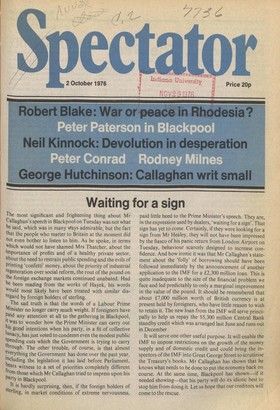Waiting for a sign
The most significant and frightening thing about Mr Callaghan's speech in Blackpool on Tuesday was not what he said, which was in many Ways admirable, but the fact that the people who matter to Britain at the moment did not even bother to listen to him. As he spoke, in terms Which would not have shamed Mrs Thatcher, about the invortance of profits and of a healthy private sector, about the need to restrain public spending and the evils of Printing 'confetti' money, about the priority of industrial regeneration over social reform, the rout of the pound on the foreign exchange markets continued unabated. Had he been reading from the works of Hayek, his words Would most likely have been treated with similar disregard by foreign holders of sterling.
The sad truth is that the words of a Labour Prime Minister no longer carry much weight. If foreigners have Paid any attention at all to the gathering in Blackpool, it. Was to wonder how the Prime Minister can carry out his good intentions when his party, in a fit of collective lunacy, has just voted to condemn even the modest public sPending cuts which the Government is trying to carry through. The other trouble, of course, is that almost everything the Government has done over the past year, including the legislation it has laid before Parliament, hears witness to a set of priorities completely different trom those which Mr Callaghan tried to impress upon his Party in Blackpool.
.is hardly surprising, then, if the foreign holders of sterling, in market conditions of extreme nervousness,
paid little heed to the Prime Minister's speech. They are, in the expression used by dealers, 'waiting for a sign'. That sign has yet to come. Certainly, if they were looking for a sign from Mr Healey, they will not have been impressed by the fiasco of his panic return from London Airport on Tuesday, behaviour scarcely designed to increase confidence. And how ironic it was that Mr Callaghan's statement about the 'folly' of borrowing should have been followed immediately by the announcement of another application to the IMF for a £2,300 million loan. This is quite inadequate to the size of the financial problem we face and led predictably to only a marginal improvement in the value of the pound. It should be remembered that about £7,000 million worth of British currency is at present held by foreigners, who have little reason to wish to retain it. The new loan from the IMF will serve principally to help us repay the S5,300 million Central Bank standby credit which was arranged last June and runs out in December
It will serve one other useful purpose. It will enable the IMF to impose restrictions on the growth of the money supply and of domestic credit and could bring the inspectors of the I M F into Great George Street to scrutinise the Treasury's books. Mr Callaghan has shown that he knows what needs to be done to put the economy back on course. At the same time. Blackpool has shown---if it needed showing—that his party will do its idiotic best to stop him from doing it. Let us hope that our creditors will come to the rescue.


































